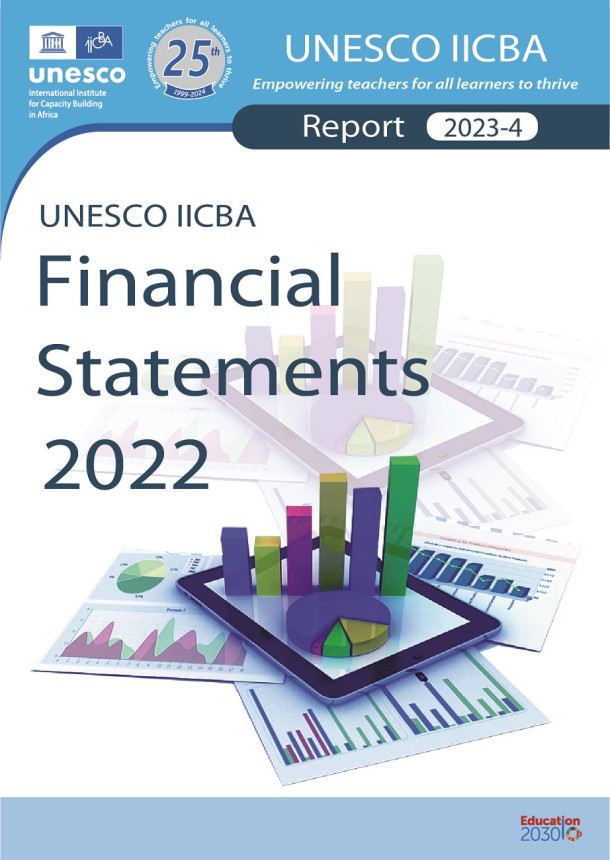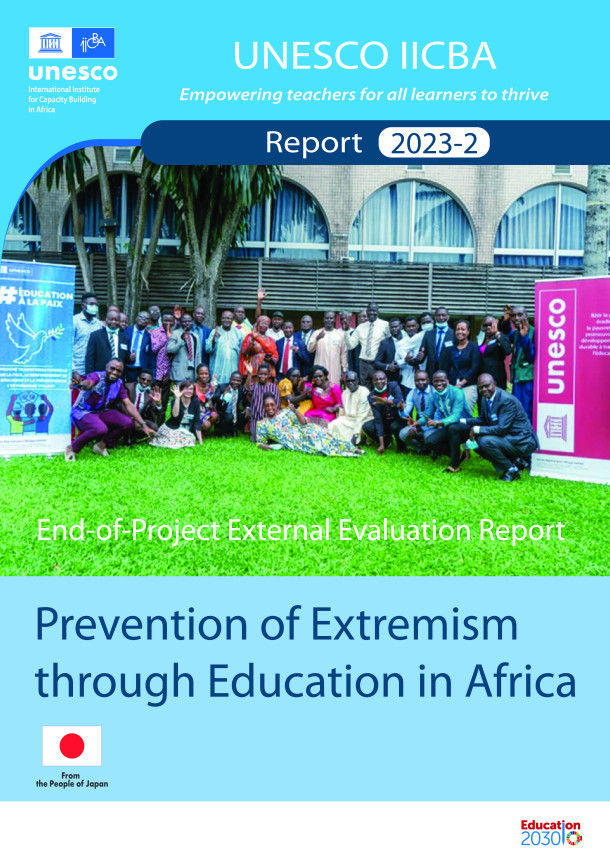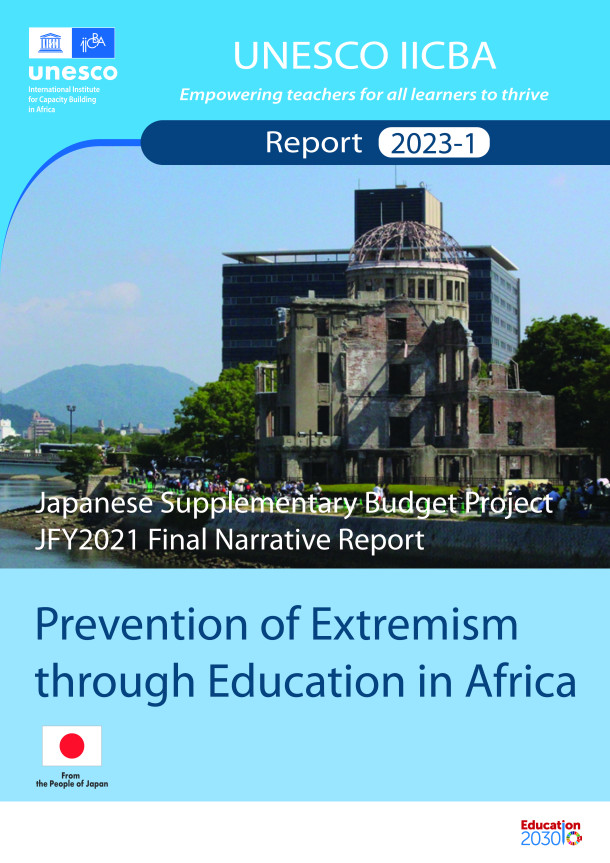
IICBA Reports
GPE KIX Africa 19 Hub Fourth Annual Interim Technical Report, April 2023 – March 2024
The Global Partnership for Education’s (GPE) Knowledge and Innovation Exchange (KIX) Africa 19 Hub has completed its fourth project year under the lasting effects of the education crisis exacerbated by the COVID-19 pandemic. The Hub has fully opened for in-person engagement while also regularly employing hybrid and virtual modalities that allow more countries to join activities, including from resource[1]constrained areas across the region. Notwithstanding challenges in implementation, in the fourth year of the project, the team has managed to organize over two dozen capacity-strengthening and knowledge[1]sharing events. These have included learning series organized through communities of practice; cross[1]country learning through learning exchange visits; online webinars with regional experts and practitioners; national dialogues led by Ministries of Education; and expert supported national EMIS system reviews. The fourth year of the project concluded on a positive note especially in terms of continued active participation and ownership of the Hub among member countries.

UNESCO IICBA 2023 Progress Report
This report provides an overview of IICBA’s progress in 2023 towards implementing its new strategic plan for 2023-25. IICBA is celebrating its 25th anniversary this year at the same time as the African Union has designated 2024 as the Year of Education. The institute had a great year in 2023. Thanks to record resource mobilization, IICBA’s planned budget for 2024 is at four times the average budget in the last five years, enabling the Institute to have a larger impact. Furthermore, IICBA expanded its capacity enhancement activities by launching an Executive Education and Policy Academy, it invested in research and policy dialogue to inform capacity enhancement activities, and it strengthened its external communications and partnerships.

This report by the Governing Board of the UNESCO International Institute for Capacity-Building in Africa (IICBA) outlines selected Institute activities for 2022-2023. This has been a period of substantial change at IICBA with (i) new leadership since December 2022; (ii) a new Strategic Plan for 2023-2025; (iii) a stronger emphasis on research and knowledge to inform policy dialogue and advocacy, both of which help prioritize capacity-building activities; (iv) promising gains in resource mobilization through voluntary contributions; (v) better communications including a new website and the launch of the Executive Education and Policy Academy; and (vi) an expansion of partnerships. As a result, IICBA is gradually improving its ability to fulfil its mission, which is to meet the needs of Africa in the areas of teacher development, school leadership and management, and school supervision and support, with an emphasis on the production, sharing, and dissemination of knowledge. As per the Institute’s Statutes, this is to be done by (i) providing up-to-date capacity building programmes; (ii) promoting and conducting research into teacher issues; (iii) promoting effective knowledge management; (iv) working with centres of excellence with a view to enlisting their involvement in the activities of the Institute; and (v) promoting exchanges of experience, expertise, and programmes.

Mental health and well-being have received increasing recognition following COVID-19, yet persistent challenges continue to exist within the education sector and such support is often not sufficiently given to teachers. UNESCO International Institute for Capacity Building in Africa (IICBA) has been partnering with the UNESCO Multisectoral Regional Office for Southern Africa since 2020 to build resilience and strengthen mental health and psychosocial support (MHPSS) for teachers and teacher educators in selected sub-Saharan African countries. The project is anchored within the framework of UNESCO’s regional programme “Our Rights, Our Lives, Our Future (O3)”, which envisions a sub-Saharan Africa where all adolescents and young people attain positive health, education, and gender equality outcomes. This synthesis report summarizes the progress made since the outset of the initiative.

Report of the CESA Teacher Development Cluster on Activities for 2022-23
The CESA cluster managed by IICBA has met on a quarterly basis over the period in review and has continued to make progress on core activities. Eight developments are worth emphasizing: (1) Cluster members have promoted the use by member states of existing African Union instruments on professional standards and competencies for teachers; (2) The cluster has shepherded the adoption of new African Union instruments; (3) Cluster members have actively collaborated with other CESA clusters, the African Union ESTI team and its two centers CIEFFA and IPED; (4) The cluster has helped organize the Continental Teacher Award; (5) The cluster has contributed to the preparation of the African Union’s Year of Education in 2024; (6) Funding has been provided for a review of CESA 16-25 through KIX Africa 19; (7) The cluster implemented a survey of its members to assess priorities; and (8) The cluster has agreed to new activities.

UNESCO IICBA Financial Statements 2022
This report provides the financial statements of UNESCO IICBA for calendar year 2022. These financial statements have been prepared in accordance with the International Public Sector Accounting Standards (IPSAS) and comply with the Financial Regulations of the UNESCO. Revenue in 2022 increased by 31 percent versus 2021 while expenditure decreased by 12 percent, leading to an increase in net assets. The report is available here.

IICBA Strategic Plan 2023-25 Report
IICBA’s strategic plan is available here. IICBA’s mission is crystallized in its new motto: “Empowering teachers for all learners to thrive.” IICBA implements its mission through three main lines of action: (1) research and knowledge; (2) policy dialogue and advocacy; and (3) capacity enhancement. Research informs policy dialogue and advocacy, which in turn help set priorities for capacity enhancement.

GPE KIX Africa 19 Hub Third Annual Interim Technical Report, April 2022 – March 2023
The Global Partnership for Education’s (GPE) Knowledge and Innovation Exchange (KIX) Africa 19 Hub has completed its third project year under the lasting effects of the education crisis of COVID-19, and in a mostly remote, virtual environment which has both enabled and hindered participation across the region. Notwithstanding challenges in implementation, in the third year of the project, the project team managed to organize 15 capacity-strengthening and knowledge sharing events, eight of which were research-based and eight of which were country-led.
As the third year of the project comes to an end, there has been progress in the six thematic areas, and implementation has improved compared to previous years, especially in terms of promoting active participation and ownership of the Hub among member countries.

Prevention of Extremism through Education in Africa: End-of-Project External Evaluation Report
Excerpts from the Executive Summary: “The following are the key evaluation findings: In terms of effectiveness, the project components and objectives were relevant, project outputs were appropriate and well used, the project main goal was realised, teamwork was achieved, and the project had a high level of visibility. In terms of efficiency, internal structures were well utilised to achieve project objectives, value for money realised, project scope fully covered, resources and funds well distributed and managed, all project activities implemented as planned and project targets were met. In terms of sustainability, local stakeholders were involved, government departments participated in the project, stakeholders were committed to continuously supporting project activities, the Training of Trainers (ToT) strategy was used to extend training to various training institutions, peace clubs were established to continue activities with support from the training institutions, local resources were used to support project activities and peace education was integrated in the traditional training curriculum.”

This report details the purpose, activities, and outcomes of the FY2021 Japanese supplementary budget project “Prevention of Extremism and its Resurgence amid the COVID-19 Pandemic through Education in Africa, aligned with the Spirit of TICAD7 and NAPSA.” The project was designed in response to the emerging issues of violence in and around learning environment amidst the COVID-19 pandemic. Building on the previous Japan-funded peacebuilding projects, 10 countries were selected as direct target countries, while other countries were also supported to maintain good practices and initiatives which started during the previous project periods. This project aimed to support African Member States in enhancing their capacity to use education to prevent violent extremism amid the COVID-19 pandemic. Violent extremism is a complex phenomenon that requires both structural and cultural approaches. It necessitates a thorough understanding of dynamic local contexts, including power structures, historical background, and spiritual beliefs, to address its root causes. Individuals thus need the competencies to critically reflect on their surroundings and prevalent narratives, collaborate with others, and find alternative nonviolent actions, making the role of teachers and education critical.

Selected Previous Reports (Up to 2022)
Bespoke Peacebuilding Training for Rotarians and Young Peace Advocates in Nigeria: Training Report
KIX Africa 19 Hub In-Depth Country Mapping
Norwegian Teacher Initiative Teacher Policy Capacity Workshop-Malawi: Meeting Report
La Réunion sur « les Modalités de soutien et de motivation des enseignants. Cas du Burundi. »
Webinar on Teachers: Leading in Crisis, Reimagining the Future - Webinar Report
Indo-Africa Discussion: Sharing Experiences on Teachers During COVID-19: Meeting Report
Psychosocial Support to Teachers during COVID-19 Crisis: Meeting Report
Conducting Learning Assessment in Africa during School Closures: Meeting Report
Next Einstein Forum - African Science Week in Ethiopia 2019: The second annual Africa Science Week (ASW) in Ethiopia, co-organized by UNESCO IICBA and Next Einstein Forum (NEF) held from 14 to 20 December 2019
Next Einstein Forum - African Science Week: Ethiopia Report
Report on the Follow-up Plan Meeting Held in Addis Ababa on June 7th and 8th 2017

